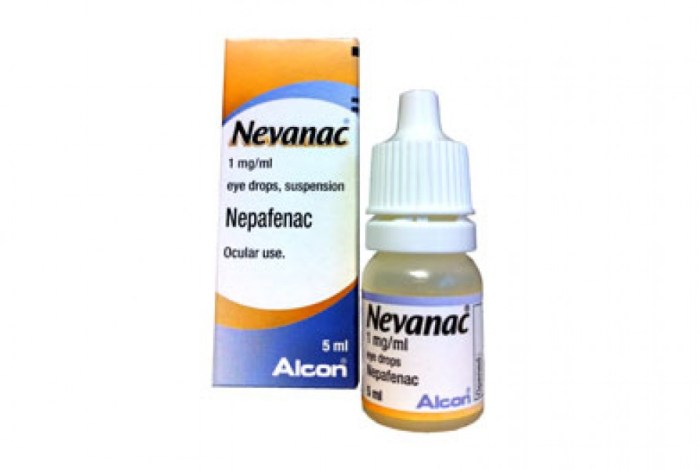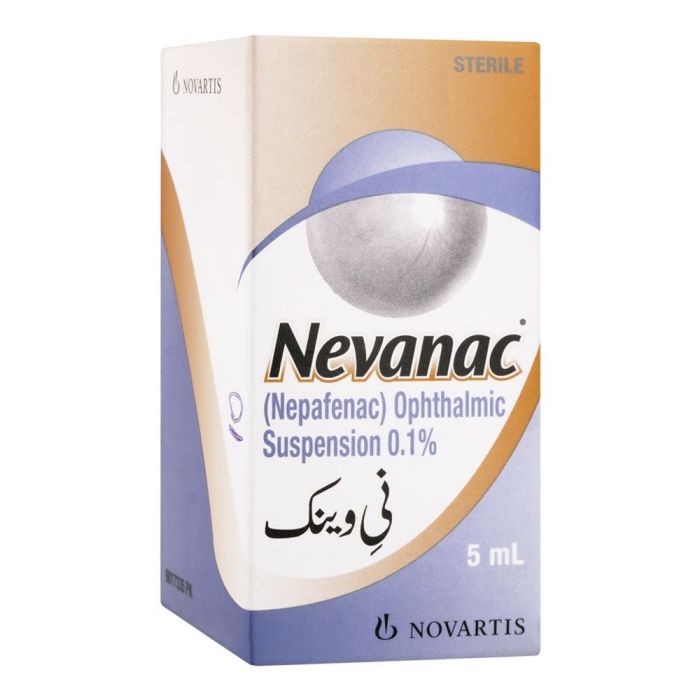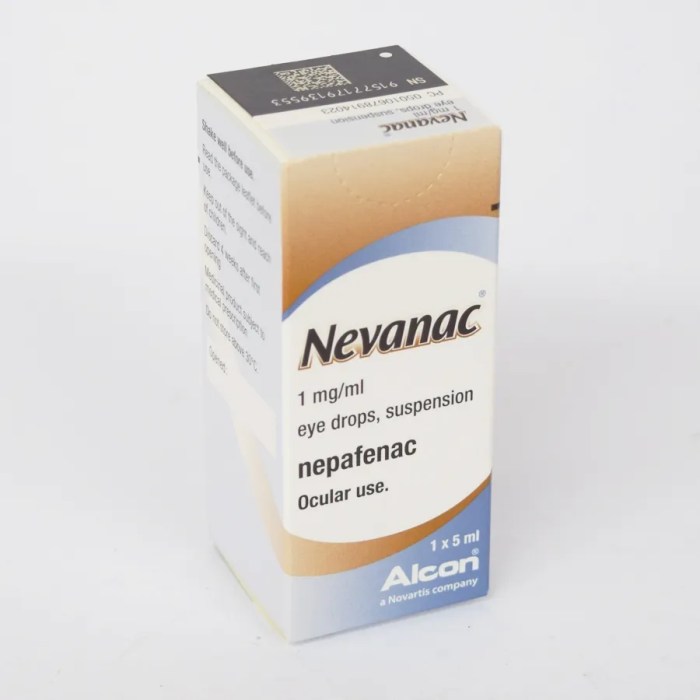Nevanac eye drops, a potent anti-inflammatory medication, offer relief for patients recovering from various eye surgeries. This prescription medication, formulated with the active ingredient bromfenac sodium, targets inflammation at the source, promoting healing and reducing discomfort.
Its precise mechanism involves inhibiting the production of inflammatory chemicals, thereby reducing swelling, redness, and pain. While Nevanac eye drops are primarily used after surgery, they can also be prescribed for other eye conditions, making them a valuable tool in ophthalmic care.
Storage and Disposal: Nevanac Eye Drops

Proper storage and disposal of Nevanac eye drops are crucial to ensure their effectiveness and safety. Storing the medication correctly helps to maintain its quality and prevent contamination, while proper disposal minimizes the risk of accidental ingestion or environmental harm.
Storage of Nevanac Eye Drops
Storing Nevanac eye drops correctly is essential to maintain their effectiveness and prevent contamination. Here are some key storage guidelines:
- Store Nevanac eye drops at room temperature, between 15°C and 30°C (59°F and 86°F).
- Keep the bottle tightly closed when not in use.
- Avoid storing Nevanac eye drops in direct sunlight or extreme temperatures.
- Do not freeze Nevanac eye drops.
- Keep Nevanac eye drops out of reach of children and pets.
Disposal of Nevanac Eye Drops
Proper disposal of unused or expired Nevanac eye drops is crucial to prevent contamination and accidental ingestion. Here’s how to dispose of them safely:
- Do not flush Nevanac eye drops down the toilet or drain.
- Check with your local pharmacy or waste disposal service for instructions on how to dispose of medications properly.
- Many communities have drug take-back programs where you can safely dispose of unwanted medications.
- Remove any identifying labels from the bottle before disposing of it.
It is important to note that Nevanac eye drops should not be shared with others, even if they have the same condition.
Legal and Regulatory Aspects

Nevanac eye drops, like all pharmaceutical products, undergo rigorous regulatory scrutiny to ensure safety and efficacy. The legal and regulatory framework governing Nevanac’s manufacture, distribution, and use is complex and involves multiple government agencies.
Regulatory Approval Process
The regulatory approval process for Nevanac eye drops is a multi-step procedure designed to ensure the drug’s safety and efficacy. The process begins with pre-clinical studies, where the drug’s effects are tested in animals. If these studies are successful, clinical trials are conducted in humans. These trials involve different phases to assess the drug’s effectiveness, dosage, and potential side effects.
The data from these trials is then submitted to regulatory agencies, such as the U.S. Food and Drug Administration (FDA) or the European Medicines Agency (EMA), for review. The agencies scrutinize the data and may request additional information or trials before granting approval.
Legal and Regulatory Requirements
The manufacture, distribution, and use of Nevanac eye drops are subject to strict legal and regulatory requirements. These requirements are designed to ensure the drug’s quality, safety, and effectiveness.
- Good Manufacturing Practices (GMP): GMPs are a set of guidelines that ensure the consistent production of high-quality drugs. Pharmaceutical companies manufacturing Nevanac eye drops must adhere to these practices.
- Labeling and Packaging: The packaging and labeling of Nevanac eye drops must comply with regulatory standards. This includes clear instructions on dosage, administration, and potential side effects.
- Distribution and Storage: Nevanac eye drops must be distributed and stored under controlled conditions to maintain their quality and prevent contamination.
- Prescription Requirements: In many countries, Nevanac eye drops are available only with a prescription from a qualified healthcare professional. This ensures that the drug is used appropriately and safely.
Role of Government Agencies
Government agencies play a crucial role in regulating the use of Nevanac eye drops. These agencies are responsible for:
- Approval and Licensing: Agencies like the FDA and EMA are responsible for reviewing and approving new drugs, including Nevanac eye drops.
- Monitoring and Enforcement: These agencies monitor the safety and effectiveness of Nevanac eye drops after approval. They investigate any reports of adverse events or quality issues and can take enforcement actions if necessary.
- Public Health Protection: Government agencies are responsible for protecting public health by ensuring that drugs like Nevanac eye drops are safe and effective.
Ethical Considerations

The use of Nevanac eye drops, like any pharmaceutical product, raises ethical considerations that must be carefully weighed. These considerations involve the potential risks and benefits of the medication, the importance of informed consent, and the ethical aspects of marketing and promotion.
Informed Consent in the Use of Nevanac Eye Drops
Informed consent is a fundamental ethical principle in healthcare. It ensures that patients understand the potential risks and benefits of a treatment before making a decision. In the context of Nevanac eye drops, informed consent involves providing patients with comprehensive information about the medication, including its intended use, potential side effects, and alternative treatment options. This information should be presented in a clear and understandable manner, allowing patients to make informed decisions about their treatment.
Understanding the benefits, potential side effects, and proper administration of Nevanac eye drops is crucial for patients seeking effective post-surgical recovery. Always consult your ophthalmologist for personalized guidance and ensure you follow their instructions carefully. With proper use, Nevanac eye drops can play a significant role in promoting a smoother and more comfortable recovery journey.
Nevanac eye drops are a common treatment for post-operative inflammation, helping to reduce pain and discomfort after eye surgery. While Nevanac works directly on the eye, some conditions that cause inflammation may also be treated with medications like hydroxyurea , which targets the body’s immune system. It’s important to consult with a doctor to determine the best treatment for your specific needs, whether it’s Nevanac for eye inflammation or a more systemic approach like hydroxyurea.